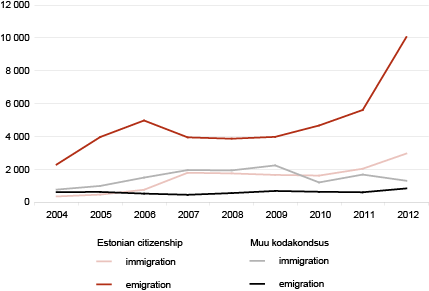Most of emigrants from Estonia still go to Finland
In 2012, emigration reduced the population number in Estonia by 6,629 people, 10,873 persons emigrated and 4,244 immigrated. Emigration is characterised by the trend that among persons leaving Estonia women predominate, but among persons coming to Estonia the majority are men, which is the reason why the number of women decreases more due to emigration. By age, the most active participants in emigration are persons aged 20–44.
The main destination countries of emigration are Finland and the United Kingdom, People immigrate to Estonia mainly from Finland and Russia. This trend has continued for the past five years. In 2012, the net migration of Estonia was positive with Russia and Ukraine, from where more people came to Estonia than emigrated there. The net migration of Estonia with Finland and the United Kingdom was negative, 5,000 persons more emigrated to Finland in 2012 than immigrated to Estonia and over a thousand persons more emigrated to the United Kingdom than immigrated from there to Estonia.
In 2012, 90% of emigrants and 70% of immigrants were Estonian citizens. In Estonian emigration the trend towards the countries offering bigger economic welfare is obvious. The majority of immigrants are Estonian citizens; this may also be considered re-migration (people who were born in Estonia and their children born abroad come to Estonia). The rest are mainly immigrants from Russia (24% of the immigrants in 2012) for whom Estonia is a country with higher living standard. According to the trend of the past years, 30–40% of Estonian citizens having emigrated from Estonia return here.
Estonian migration trends are similar to those of Latvian and Lithuanian, where emigration has also intensified during the recent years – the share of emigrants among the citizens of the native country has increased. At the same time it must be stated that it is also common for Scandinavian and Western European countries that young people with the citizenship of their native country leave and the number of those who return is much smaller than the number of those who leave.
It can be seen from the data of the Population Census that Estonia has been a destination country of migration, but this period has remained in the past century – the majority of persons born abroad have come to Estonia in the 1950s–1980s, they are now at their late working age or pension age and originate from the territory of the former Soviet Union. According to the data of the Population Census, the number of persons born in Western countries was the biggest among under-age children, the main countries of birth are Finland and USA and it can be assumed that they are mainly the children born abroad of those people who have returned to Estonia. People born in Estonia, but having lived permanently abroad in 2000–2011 have come mainly from Finland, the United Kingdom, USA and Russia. Estonian migration with the same countries was also shown by statistics based on Population Register.
International migrants by citizenship, 2004–2012
The schedule of publication of the results of PHC 2011 is available on the website www.stat.ee/phc2011.
The eleventh Population Census in Estonia was conducted from 31 December 2011 until 31 March 2012. Previous censuses were carried out in 1881, 1897, 1922, 1934, 1941, 1959, 1970, 1979, 1989 and 2000. The next Population Census in Estonia will be conducted in 2020/2021.
